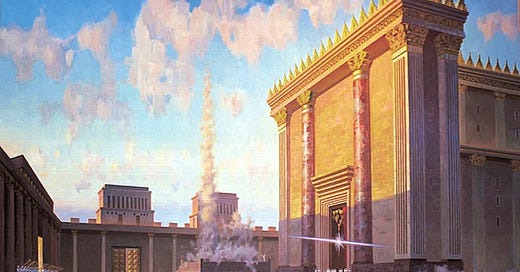I’ve been thinking again about whether or not zionism is hardwired into Judaism and I want to publish a segment from a new book about the growth and evolution of messianic zionism that I think supports my view of things. The book is by Rachel Feldman, who we talked to on the pod last month.
I got a decent amount of abuse a few months ago when I made the argument that a zionist way of thinking — that is, a way of looking at the world through a lens of messianic ethno-religious nationalism — is indeed a core part of Judaism and is present in core Jewish texts. I think I was (and am) much more right than wrong about my view on this. And I’m not the only one who has seen the same pattern. We talked to Rachel very briefly about it on the pod. And now, looking over her book again, I realize that she has a great, succinct section that gets into this topic specifically…and gets into it in a way that I think buttresses my interpretation.
As I wrote in my original essay on it, one thing that been constant for the past 2,000 or so years in Jewish culture (despite some brief blips) is Jewish attachment to the holy land — territory the pious have believed their god, the Hebrew god, gave to the Jews. And connected to this core belief have been messianic dreams and prophecies that Jews will one day return to their god-given land, establish a Jewish rule there, and rejuvenate the Jewish people. It’s what I initially called “ancient zionism.” And I argued that it has been a powerful force in both secular and religious Jewish communities.
As Rachel shows, this messianic earning for Jewish return to the holy land has manifested in all sorts of ways over the years — from rabbis pining for the re-establishment of Jewish theocracy in Jerusalem but arguing for the need to stay passive, that it will be god who restores Jews to the land…to Jewish prophets and sages in Europe trying to lead Jews back to Jerusalem, even predicting the exact year that the messiah will come and reestablish Jewish rule in the holy land…all the way to militant secular zionists who rejected the religion of their ancestors and yet based their European-style nationalist claims on the very same Jewish religious books that they rejected, and who argued for wrenching a zionist state into being through action and force. What’s interesting is that regardless of the specific forms that this Jewish messianic attachment to the holy land has taken over the millennia, the attachment has always been there — sometimes passive, sometimes active, but always there.
That’s why zionism, particularly after the Jewish state was created and proved its mettle in battle, has had such power over both secular and religious Jewish culture. It tapped into something fundamental to Judaism, an idea that goes right to the base of a religion that has defined Jewish identity for 2,000 years. This ancient zionism can be ignored or re-interpreted and transferred into an abstracted spiritual realm…but it’s still there, ready to be used any time. And the idea is powerful and direct, informing a way of thinking about the world and about what it means to be holy and where a Jewish person fits into the grander scheme of things.
Anyway, enough of my own spin on things, here is the bit from her book — Messianic Zionism in the Digital Age:
Following the destruction of the Second Temple, Jewish messianic aspirations found expression through symbolic ritual action and prayer. Pleas for the rebuilding of the Temple and restoration of Israel became embedded in the liturgies that Jews pray three times a day. In the absence of a physical temple space, rabbinic Judaism focused on the cultivation of what Abraham Joshua Heschel referred to as “holiness in time” sacred ritual events that could be performed in a state of dislocation from the Israel and axis mundi of the Temple Mount. It is noteworthy, however, that abstract and symbolic notions of the Temple actually predate the destruction of the Second Temple and the advent of rabbinic Judaism.


